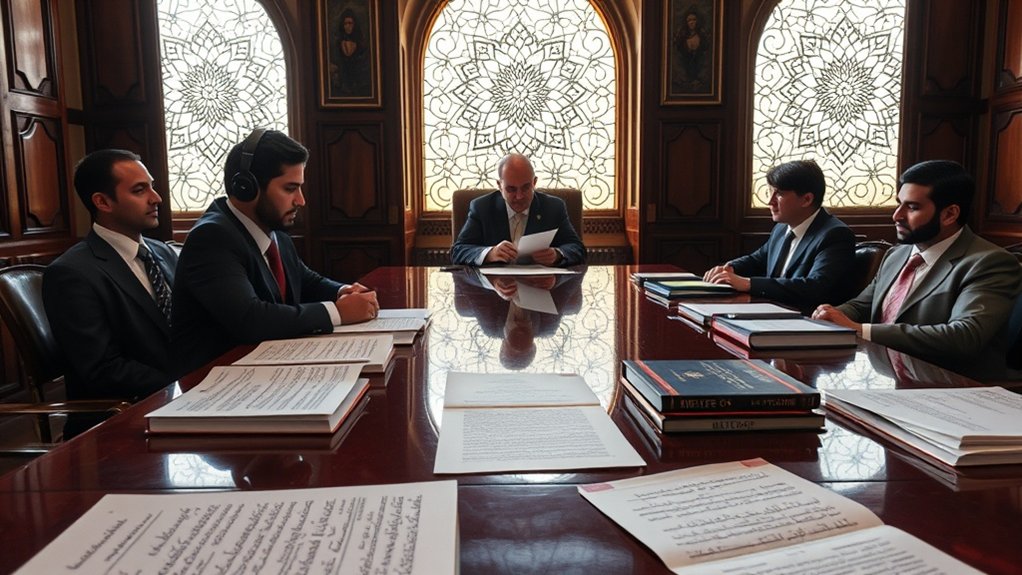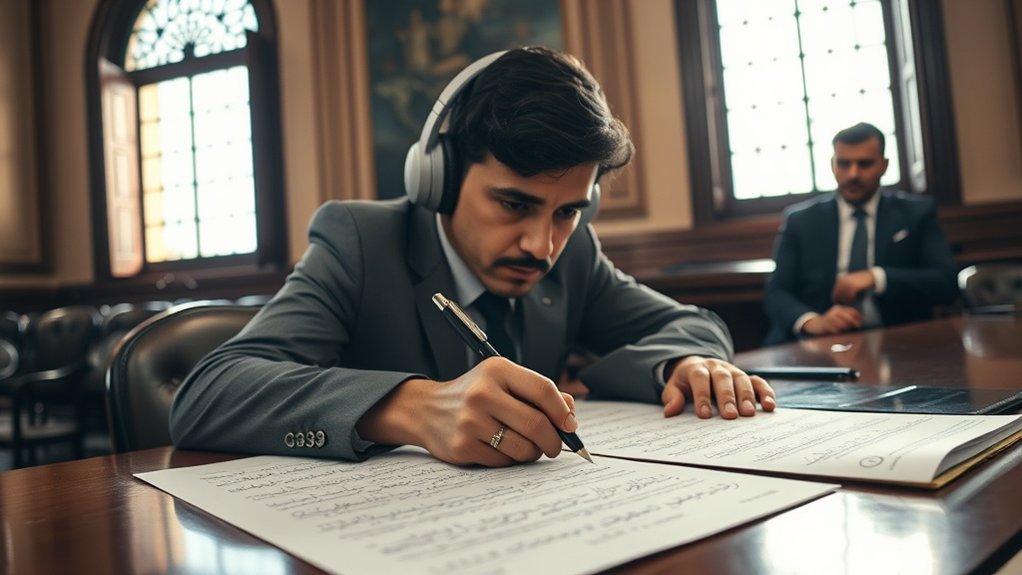When you’re facing legal proceedings in Afghanistan, precise translations can make all the difference. A single misinterpreted term could alter the course of your case, so accuracy isn’t just preferred—it’s essential. At Vieira Braga Advogados, you’ll see just how seriously this responsibility is taken. But what really sets their approach apart, and how do they safeguard your legal interests in one of the world’s most complex legal landscapes?
The Importance of Legal Precision in Afghan Court Translations

Although Afghan court proceedings often involve complex language, legal precision in translations isn’t just beneficial—it’s essential for justice. When you’re translating legal documents or courtroom exchanges, you can’t afford vague or inaccurate terminology. Precise language ensures all parties understand their rights, obligations, and the decisions being made. It prevents misinterpretations that could unfairly influence a judge’s ruling or a defendant’s fate.
If you’re involved in a legal process, you expect every word to mean exactly what it’s supposed to. A single mistranslation can alter the outcome of a case or undermine the court’s authority. Achieving legal precision in translations demonstrates respect for the law, the individuals involved, and the broader Afghan legal system.
You need accuracy not just for compliance, but for justice itself. Every party deserves clarity, and skilled legal translators make sure the court’s meaning is never lost in translation.
Immigration and court processes are filled with complex immigration regulations that require detailed attention, and working with specialized legal professionals can significantly reduce the risk of costly errors.
Common Challenges in Afghan Legal Terminology
Building on the need for precise legal translation, you’ll quickly notice that Afghan legal terminology poses unique obstacles. Legal concepts, phrases, and procedures often differ dramatically from those in other legal systems, creating significant room for misunderstanding. When you dive into Afghan court documents, you’ll face unexpected complexities arising from historical, cultural, and linguistic factors. These challenges don’t just make translation harder—they can directly impact the fairness and outcome of judicial proceedings.
- The absence of direct equivalents for many Afghan legal terms can leave you feeling frustrated and anxious about conveying the true meaning.
- Cultural nuances embedded in the language may lead to misinterpretation, risking the loss of critical context in legal arguments.
- Varying interpretations of Islamic law further complicate the translation of statutes and judicial decisions.
- The use of regional dialects and legal jargon can make even seemingly straightforward texts confusing and emotionally draining.
You can’t overlook these hurdles. For those facing the intricacies of Afghan legal language, engaging specialized legal support is crucial to ensure that documentation meets official standards and avoids costly errors.
Why Expertise Matters in Court Translation Services

Because accurate court translations can determine the outcome of a case, expertise in this field isn’t optional—it’s essential. You need translators who understand both the legal systems and the specific terminology of Afghan law. Misinterpreting a single word or legal phrase can shift the meaning of testimony, evidence, or even a court’s final judgment. With lives and futures on the line, there’s no margin for error.
When you work with professionals trained in court translation, you gain confidence in every document and court proceeding. They won’t just translate words; they’ll ensure every nuance and legal implication is preserved. Their familiarity with Afghan legal structures means they won’t confuse similar-sounding terms or overlook critical details. In legal contexts, precision is everything. If you want fair and accurate court outcomes, rely on those who bring specialized expertise to bridge the language gap seamlessly and effectively every time.
Additionally, by relying on specialists who provide personalized and updated guidance, you significantly increase your chances of success and reduce the risk of costly mistakes during vital court proceedings.
The Role of Cultural Context in Legal Translations
Expertise in legal terminology lays the groundwork for accurate court translations, but understanding cultural context is what ensures that meaning isn’t lost between languages. When you’re dealing with Afghan court documents, cultural nuances can determine whether a translation holds up in court or creates confusion. You can’t simply convert words from Dari or Pashto to English; you have to recognize the history, societal norms, and unique legal concepts tied to Afghan life. If you overlook these, you risk mistranslating intent, damaging trust, or even endangering someone’s rights.
To truly appreciate what’s at stake, imagine:
- Missing the emotional tone behind a defendant’s statement, leaving a narrative feeling cold or harsh.
- Misinterpreting a phrase due to cultural idioms, and the entire argument shifts meaning.
- Failing to recognize a gesture or custom, which could change the legal weight of testimony.
- Seeing a person’s identity misrepresented, undermining their dignity in the courtroom.
In such situations, professional legal assistance can help avoid costly errors and ensure that both linguistic accuracy and cultural sensitivity are maintained throughout the translation process.
Vieira Braga Advogados’ Approach to Accuracy

Setting themselves apart in the field, Vieira Braga Advogados treats accuracy as a rigorous, non-negotiable standard when translating Afghan court documents. You’ll notice they approach every assignment with a deep understanding that every word, phrase, and legal nuance matters in a court context. They don’t just translate; they carefully convey the intention behind each legal term, ensuring that nothing gets lost between languages.
You can trust their translators to cross-reference Afghan legal texts with relevant local statutes, double-check terminology, and verify references for total precision. Instead of relying solely on literal translations, they focus on meaning and context, so you get documents fit for legal proceedings without ambiguity. They also employ ongoing training for their teams in both Afghan and comparative legal frameworks. This disciplined, detail-oriented method minimizes errors and builds confidence in the certified translations required by courts and legal professionals like you. In addition, their team’s expertise in immigration laws allows them to navigate the complex regulations often present in cross-jurisdictional court matters, further reducing the risk of costly or time-consuming errors.
Case Studies: Successful Afghan Court Document Translations
When handling Afghan court document translations, real-world examples highlight just how crucial accuracy and context truly are. You face challenging situations where a single mistranslation can compromise an entire legal strategy or even a client’s basic rights. At Vieira Braga Advogados, you’ll see how expert translators navigate the fine details of Afghan legal language, ensuring that justice isn’t lost in translation. Imagine defending someone’s property, securing asylum, or responding to criminal accusations—each scenario demands utmost precision. Drawing from successful case studies, you can appreciate what’s at stake and how meticulous legal translation truly changes outcomes.
- Families reunited after years of legal limbo, thanks to correct document interpretation
- Wrongful criminal charges overturned because of precise translation of court rulings
- Vital business contracts upheld in cross-border disputes due to accurate terminology
- Asylum granted when personal statements were translated with cultural sensitivity
Every case demonstrates what’s possible when expertise and dedication combine. The support of a legal team with deep knowledge of immigration law complexity also ensures that document translation aligns with evolving regulations and minimizes the risks inherent in international cases.
Protecting Client Interests Through Expert Legal Linguistics

You need absolute precision in legal terminology to protect your clients’ rights in Afghan court cases. You can’t overlook the importance of safeguarding confidential information during the translation process. By bridging cultural and linguistic gaps, you ensure every nuance is accurately represented and your clients’ interests remain secure. Working with experienced immigration lawyers greatly reduces the risk of errors and ensures compliance with up-to-date legal requirements throughout the translation and litigation process.
Precision in Legal Terminology
Although the stakes are high in every legal matter, precise use of terminology is essential to protect a client’s interests in Afghan court proceedings. You can’t afford misunderstandings—one mistranslated word could alter a verdict or jeopardize a case. That’s why expert legal linguistics matter so much. Every phrase must align with Afghan law’s intricacies, so your position remains crystal clear to all parties. Don’t let ambiguity put your future at risk; linguistic accuracy is your safeguard. When you trust professionals who specialize in both language and law, you’re giving your case its best possible chance. Justice can slip away with a single error. Your future shouldn’t hinge on unclear communication. Peace of mind comes from knowing every word counts. Stand strong through unambiguous representation. For Afghan court matters, the advantage of specialized legal guidance ensures proper documentation and can make a crucial difference in the outcome.
Safeguarding Confidential Case Details
Because sensitive information often surfaces during court proceedings, it’s vital to ensure that every detail stays secure and confidential. When you’re involved in Afghan legal processes, the risk of exposure escalates if translators lack expertise or fail to follow strict confidentiality protocols. You need professionals who don’t just translate; they understand the legal stakes and respect attorney-client privilege at every step. At Vieira Braga Advogados, expert legal linguists employ rigorous measures, encrypt communications, and restrict document access to authorized personnel only. They never leave sensitive data vulnerable during translation or interpretation. By trusting seasoned specialists, you guard your interests and prevent unauthorized disclosures. Protect your case by choosing translators who prioritize security, confidentiality, and your reputation within Afghanistan’s legal system. For those navigating international legal proceedings, having support from professionals with specialized knowledge of complex immigration and judicial protocols significantly reduces risk and strengthens your legal position.
Bridging Cultural Linguistic Gaps
Safeguarding sensitive information goes hand in hand with ensuring that nothing gets lost or misunderstood during the translation of legal proceedings. When you bridge cultural and linguistic gaps, you’re not just translating words—you’re protecting your client’s rights and ensuring their voice is truly heard. Legal terms in Afghan court settings often carry unique cultural nuances, so it’s crucial you don’t let anything slip through the cracks. With expert legal linguistics, you gain more than accuracy; you gain advocacy rooted in deep respect for both language and culture.
- Feel confident your client’s interests are fully represented.
- Prevent costly misunderstandings that could jeopardize outcomes.
- Safeguard fairness by ensuring every detail is interpreted faithfully.
- Empower your clients to participate and trust the legal process.
By working with experienced professionals who understand the complexity of immigration laws, you further reduce the risk of errors and ensure greater legal protection for clients navigating international legal matters.
Key Considerations When Choosing a Legal Translation Partner

When selecting a legal translation partner for Afghan court proceedings, you need someone who understands both the legal systems and linguistic nuances involved. Don’t just look for fluency in Dari or Pashto; demand expertise in Afghan and international legal terminology. You should assess the translator’s knowledge of Afghan court structures, legal procedures, and documentation requirements. Accuracy is non-negotiable—errors can lead to serious misunderstandings or even jeopardize your case.
You’ll also want confidentiality assurances, since legal documents often contain sensitive information. Check for professional certifications and proven experience in legal translation, especially with Afghan disputes. Effective communication is essential; your partner must be responsive and capable of explaining legal jargon clearly. Finally, consider their turnaround times. Courts often work on tight deadlines, so your translation partner’s reliability could impact the outcome. By focusing on these factors, you ensure your Afghan legal matters are handled with precision and professionalism.
Frequently Asked Questions
What Languages Does Vieira Braga Advogados Translate Afghan Court Documents Into?
Vieira Braga Advogados translates Afghan court documents into multiple languages, including English, Portuguese, and sometimes other major European languages like Spanish or French, depending on your needs. You don’t have to worry about losing nuances or accuracy in legal terminology, because their team specializes in delivering precise translations. If you require translations into specific languages, you can contact them directly, and they’ll accommodate your legal or professional requirements efficiently.
How Long Does a Typical Afghan Court Document Translation Take?
A typical Afghan court document translation usually takes you between three to seven business days, depending on the document’s length and complexity. If you need certification or a legal review, it may add an extra day or two. You’ll want to provide all relevant materials upfront for the fastest turnaround. If you’re on a deadline, most providers can offer expedited service, but you’ll need to request it and may pay an extra fee.
Are Vieira Braga Advogados’ Translators Certified in Afghan Languages?
Yes, you’ll find that Vieira Braga Advogados’ translators are indeed certified in Afghan languages. When you work with them, you can trust they’ve proven their language proficiency and legal translation skills through recognized certifications. This ensures every legal term and nuance is translated accurately. You don’t have to worry about misunderstandings or errors, as their team’s credentials guarantee professionalism and reliability for even the most complex Afghan court documents you need translated.
What Is the Cost Structure for Afghan Court Translations?
You’ll usually find that the cost structure for Afghan court translations depends on factors like document length, language pair, complexity, and turnaround time. Expect to pay per word, page, or hour, with surcharges for urgent or certified translations. You might also see flat rates for common documents such as court orders or certificates. Always ask for a detailed quote upfront so you know exactly what you’re paying for before proceeding.
Can Clients Request Urgent or Expedited Translation Services?
Yes, you can request urgent or expedited translation services. When you need legal documents translated quickly, simply let the translation provider know your deadline. They’ll usually offer fast-track options, though you should expect an additional fee for the expedited service. To speed up the process, provide clear instructions and complete documentation. It’s a good idea to communicate any specific requirements so your translation meets exact court or legal standards on time.
Conclusion
When you need Afghan court translations, you can’t afford to compromise on accuracy. Trusting Vieira Braga Advogados means you’re choosing experts who understand the critical nuances of Afghan law and legal terminology. Their commitment to cultural context, continuous training, and meticulous review ensures your rights are protected from start to finish. By partnering with them, you’ll reduce legal risks, safeguard your interests, and gain peace of mind knowing your translations are reliable and precise.



